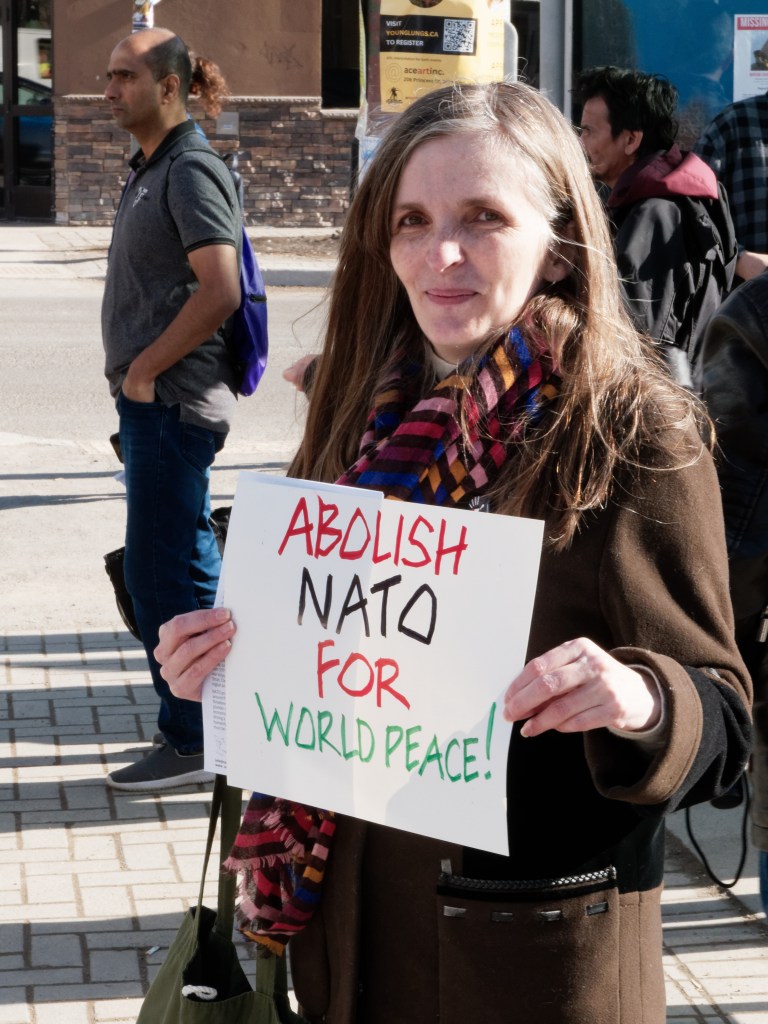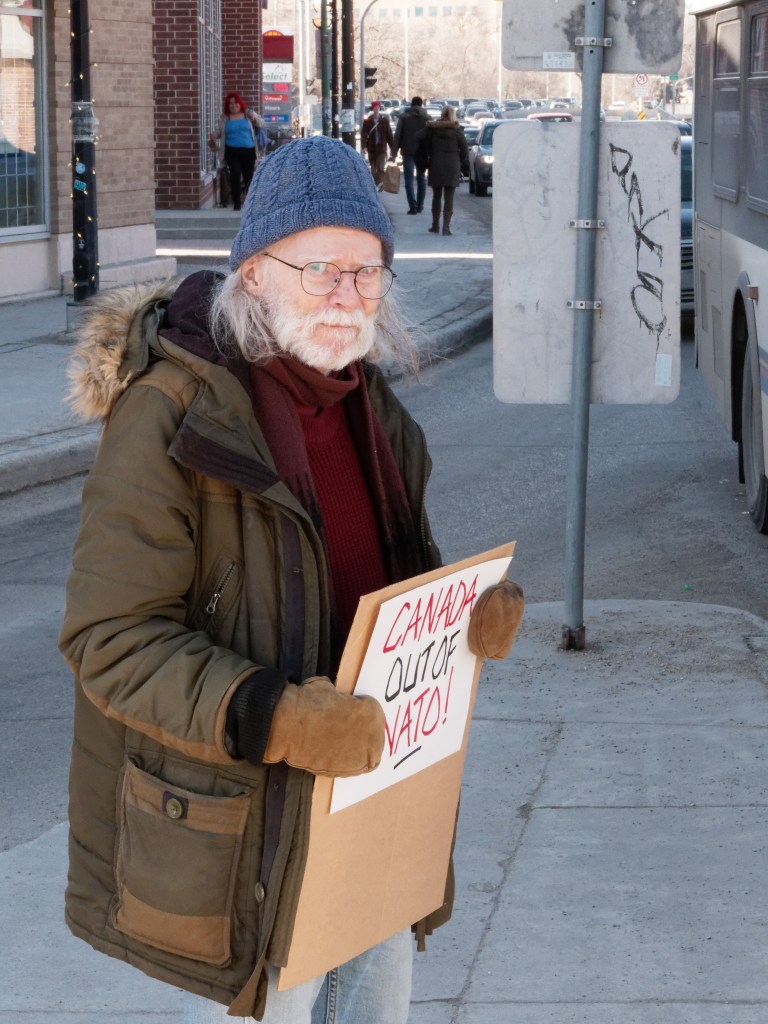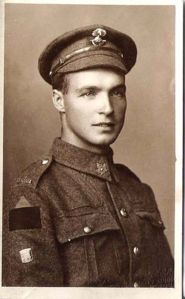Winnipeg, April 4, 2024: Members of Peace Alliance Winnipeg marked the 75th anniversary of the founding of the North Atlantic Treaty Organization (NATO) with an information picket in the Osborne Villlage neighbourhood of Winnipeg. Following is the text of the statement they distributed.
Canada Must Get Out of NATO
It’s High Time and Long Overdue!
The Biden Administration and the heads-of states of other Western powers, including Canada, are preparing to mark the 75th anniversary of the formation of the North Atlantic Treaty Organization (NATO). It will be a gala affair, with much fanfare and chest-thumping among the economic and political elites. But NATO’s continued existence is nothing to celebrate; rather, it is a time for a sober reappraisal of the dangerous role of this political-military alliance, and of Canada’s membership within it.
Neither the parties in the Canadian parliament nor the mainstream corporate media are prepared to seriously examine, much less question, our NATO status. And yet it is precisely our NATO membership – and the ‘obligations’ that entails – which is the mechanism driving increased military spending and preparations for more aggression and war.
Peace activists and organizations in Quebec and across the rest of Canada, together with allies in the labour and people’s movements, need to move this festering issue to the front burner, and intensify grassroots efforts across the country to demand Canada’s withdrawal from NATO and call for the dissolution of this dangerous military pact as a whole.
NATO was formed on April 4, 1949, with Canada as one of its founding members. This aggressive alliance was ostensibly created to preserve peace and stability, and to “safeguard the freedoms of its peoples”, based on the “principles of democracy” and “the rule of law”. Its primary raison-d’être however was to prepare for war against the former Soviet Union, which it considered an existential threat to ‘Western values’, the capitalist order and the maintenance of U.S. hegemony around the world.
Ever since its founding in April 1949, NATO has served as the vehicle to spur the arms race in the name of ‘peace through strength’. In that very same year, the Truman Administration in the United States secretly developed “Operation Dropshot’ to launch a devastating nuclear ‘first-strike’ against the former Soviet Union. Throughout the ‘cold war’ years, the U.S. and its NATO allies always maintained an overwhelming military superiority over the USSR and the Warsaw Pact – a fact that they cynically concealed from public view at the time, but now readily admit.
But NATO did not dissolve when, in the early 1990s, the USSR was dismantled and broken up (along with the Warsaw Treaty). Instead, it seized the opportunity to launch a massive expansion program into Eastern Europe, right up to the borders of the Russian Federation. In February 1990, US Secretary of State James Baker promised that NATO would not expand eastward following the reunification of Germany. His famous phrase “not one inch” was followed by a relentless NATO expansion program.
U.S. imperialist wars, taken under the mantle of NATO, have included the 78-day aerial bombardment of Yugoslavia in 1999, the invasion and occupation of Afghanistan in October 2001, and the toppling of the Kaddafi government in Libya in 2011, to name only a few examples.
At its core, NATO is the muscle enforcing class domination on behalf of Western monopolies and banks, and reflects the colonialist, supremacist policies of its ruling elites. Through its ‘Partnership’ program, NATO is extending its tentacles far beyond the North Atlantic. And it is now openly preparing to launch an Asian variant of NATO, extending its sphere of operations to the Far East to tighten the encirclement of the People’s Republic of China. In today’s world, NATO has become the primary obstacle to peace and stability. Its policies of confrontation are global in scope. Take the war in Ukraine, for example. In the early days of that horrendous conflict, Washington dispatched its NATO puppet, former UK Prime Minister Boris Johnson to Kyiv on April 9, 2022 to block a potential peace treaty between Ukraine and the Russian Federation. The proposed treaty would have seen the Russian Federation withdraw its troops in exchange for Ukrainian neutrality but NATO insisted on trying to bring Ukraine into the alliance. The results of NATO meddling have been catastrophic for Ukraine with hundreds of thousands killed and injured.
The USA is aggressively pursuing a similar approach in south-east Asia. With support from Canada and other NATO powers, the U.S. empire is trying to provoke a confrontation with China over the province of Taiwan. This provocation includes “academic exchanges” with Taiwanese military personnel being trained at NATO’s Defence College in Rome and training its fighter pilots in the United States, selling weapons to the island province dating from 1979, stationing U.S. troops and regular navy war ships and aircraft passing through the Taiwan Strait. Clearly such actions promote instability in the region and can certainly lead to another war.
NATO promotes instability, aggression and war around the world. On behalf of U.S. imperialism, it threatens, intimidates and uses military might to plunder any country or region in service of its economic and geopolitical interests. It is a monster driving a new round of militarization, bringing humanity to the precipice of nuclear annihilation. It must be dismantled, and Canada must free itselffrom its shackles and move towards a foreign policy of peace and disarmament, based on the UN Charter and international law. Canada’s membership in NATO comes with an incredibly high price-tag. It chains our country to an aggressive, militaristic alliance dominated by the United States, and makes it virtually impossible to deviate from foreign policy decisions made in Washington DC. For instance, NATO’s nuclear “first-use” policy is routinely trotted out as an excuse why Canada (and other NATO countries) must refuse to sign the UN Treaty on the Prohibition of Nuclear Weapons (TPNW). Canada’s NATO commitment also drains massive amounts of budget resources away from desperately needed social programs such as health, education, housing and environmental protection. NATO demands member countries commit 2% of their annual GDP to war and aggression, euphemistically referred to as “defence spending”. Currently Canada wastes $35 billion on war preparations, but with Canada’s $2.9 trillion GDP, that means $58 billion annually must be diverted away from social programs and services like education, healthcare, affordable housing and environmental protection.
The Canadian Peace Congress and the Mouvement Québécois pour la Paix are organizing a country-wide campaign to get Canada out of NATO (as well as NORAD and the ‘Five Eyes’ spy network). This will include organizing public protest actions on Saturday, April 6, 2024 in as many cities and localities as possible. We are also producing leaflets and posters denouncing NATO, educational activities to expose the true nature of this criminal organization, and other initiatives. We appeal to our local Peace Councils and affiliated members, and to other anti-war, labour, women’s and youth organizations to support and join these anti-NATO actions, and to help promote cooperation in building a stronger, more effective peace movement across Canada.
Canada Out of NATO!
No to war, Yes to Peace!









